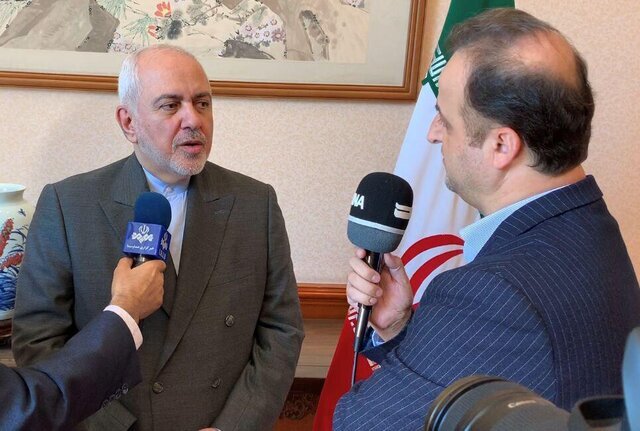There will be no bilateral talks with U.S.: Zarif

TEHRAN – Iranian Foreign Minister Mohammad Javad Zarif said on Tuesday that there will be no bilateral talks with U.S.
“In my visit to France, I announced that there will be no meeting between the Iranian and U.S. presidents as long as the United States return to the 5+1 group and implement the JCPOA [the 2015 nuclear deal]. There will be no bilateral talks even then,” he told reporters in Beijing before departing to Tokyo.
He added, “The Trump administration has violated agreements that were signed after long talks. What is essential is implementation of the agreements that were reached in the past. We have seen no action by the United States in this respect.”
French President Emmanuel Macron said on Monday that preparations were under way for a meeting between Rouhani and U.S. President Donald Trump.
Zarif made a surprise visit to Biarritz, France, where the G7 leaders were meeting on Monday.
The visit came only hours after sources said French President Immanuel Macron had been given mission by his G7 counterparts to engage in talks with Iran.
He said that in his visit to Biarritz, France, he held meetings and discussed how to preserve the JCPOA.
“In the past years, Iran has met its commitments under the JCPOA. After the U.S. withdrawal from the deal and the Europeans’ inaction, Iran decided to take actions based on paragraph 36 of the deal. Now, we are holding talks to return to previous situation and to see how Europe can fulfil its commitments,” he said.
Trump abandoned the nuclear deal in May 2018 and returned the previous sanctions and imposed new ones.
So far, Iran has taken two steps in reducing its nuclear commitments: increasing its stockpile of enriched uranium beyond the 300 kilograms allowed under the JCPOA and enriching nuclear fuel to the purity level of 4.5 percent as the Europeans missed a 60-day deadline to devise a concrete mechanism to protect the country from the U.S. sanctions.
Under the agreement, Iran was allowed to enrich uranium to 3.67 percent.
Rouhani said on August 14 that Tehran will start the next step of reducing nuclear obligations after the second 60-day deadline.
The third step can include installation of more centrifuges, especially advanced ones.
Rouhani has described Iran’s moves in reducing nuclear commitments step by step as a “wise” decision.
Officials in Tehran have insisted if the remaining parties to the JCPOA compensate sanctions effects Iran will reverse its decision.
Zarif said on August 21 that if the Europeans fully honor their commitments to the nuclear deal, Iran will immediately reverse its decision in scaling down its obligations.
“Even if the United States does not return to the nuclear deal, Iran will return to the first stage in several hours… on the condition that the European side fully implements its obligations,” Zarif said in a speech at the Stockholm International Peace Research Institute (SIPRI).
NA
Leave a Comment